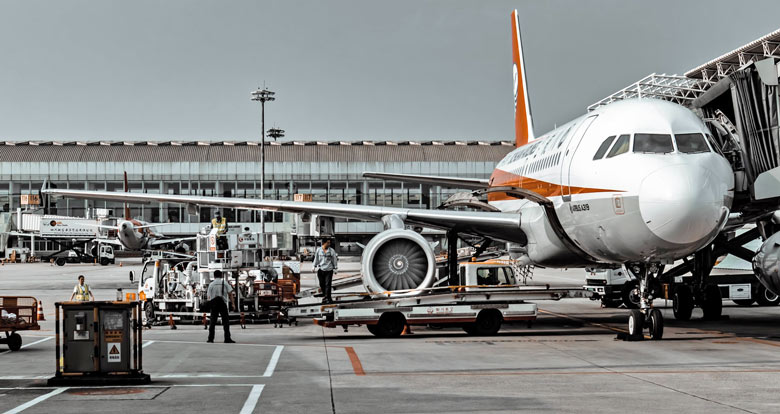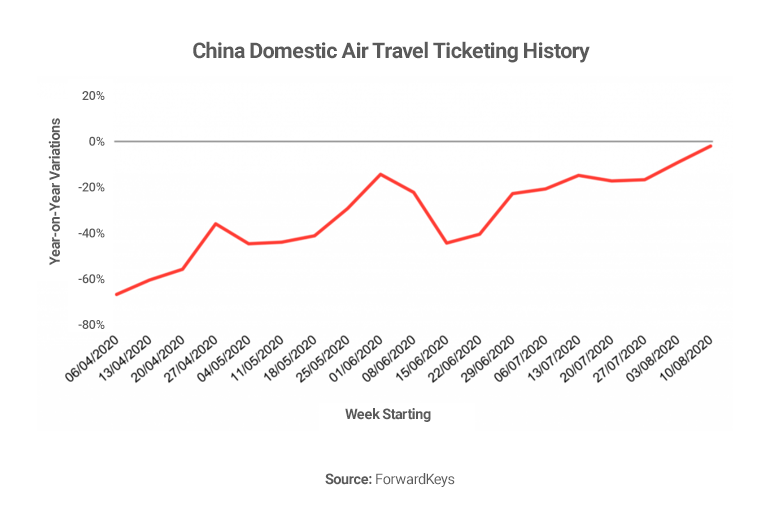
Chinese domestic air travel has been recovering steadily since the country got the COVID-19 spread under control. The industry is expected to be back at normal levels in September. Besides China’s relatively quick recovery from the pandemic, multiple airlines have also offered tickets at highly attractive prices to encourage travelers to start flying again.
Looking back at the beginning of February, thousands of domestic flights in China were canceled as the demand fell dramatically due to the government’s enforced measures to contain the pandemic, such as city lockdown and travel bans. In total, the industry suffered total losses of 39.8 billion RMB (5.6 billion USD) during the period of quarantines and social distancing.
The aviation market in China hit rock bottom in the second week of February when the number of daily flights dropped to 23% compared to normal levels of air traffic. Since then, it has slowly recovered, and experienced a strong growth during the Labor Day holiday at the start of May. This increase kept going until a second virus wave in Beijing restrained the upward flow in June, plunging the ticket sales back down again.

From mid-June, several Chinese airlines launched promotion campaigns with heavily discounted tickets and innovative packages in order to boost the demand. For example, China Eastern Airlines launched a “fly freely” program that allows passengers to fly freely across China all weekends for the rest of year at a package price of 3,322 Yuan (485 USD). Meanwhile, China Southern Airlines’ Xinjiang branch offered ticket prices at only 10% to 20% of its original prices for many routes.
In mid-July, group tours across provinces to low-risk areas of the country were resumed after the nearly-six-month ban. This act indicates the cautious openness as well as successful efforts to contain the pandemic by the Chinese government. According to CAAC (Civil Aviation Administration of China), more than 36.99 million air passenger trips were carried out in July, an increase with 20.35% compared to June. In the second week of August, the number of domestic flights hit 98% of last year’s level.
International flights however, impacted by the lockdown of many nations, are not expected to fully recover for many years. China has reopened some international routes, but with caution. A few foreign airlines including United Airlines, Delta, Lufthansa and Air France have resumed flights to Shanghai. Recently, China has just announced to resume international flights from eight countries to Beijing, including Thailand, Cambodia, Sweden, Denmark, Greece, Austria, Canada and Pakistan, but with a 14-day compulsory quarantine on arrival.
China’s fast and steady recovery of domestic aviation is a highlight in the otherwise dark outlook of the global aviation industry. Thanks to the Chinese government’s successful containment measures as well as airlines’ attractive discount programs, domestic travel demand has gradually been restored. Nevertheless, international travel will need more time to recover to its pre-pandemic level.
Read more about our other consulting services.
The insights provided in this article are for general informational purposes only and do not constitute financial advice. We do not warrant the reliability, suitability, or correctness of the content. Readers are advised to conduct independent research and consult with a qualified financial advisor before making any investment decisions. Investing in financial markets carries risks, including the risk of loss of principal. Past performance does not guarantee future results.
The views expressed herein are those of the author(s) and do not necessarily reflect the company's official policy. We disclaim any liability for any loss or damage arising from the use of or reliance on this article or its content. ARC Group relies on reliable sources, data, and individuals for its analysis, but accuracy cannot be guaranteed. Forward-looking information is based on subjective judgments about the future and should be used cautiously. We cannot guarantee the fulfillment of forecasts and forward-looking estimates. Any investment decisions based on our information should be independently made by the investor.
Readers are encouraged to assess their financial situation, risk tolerance, and investment objectives before making any financial decisions, seeking professional advice as needed.



